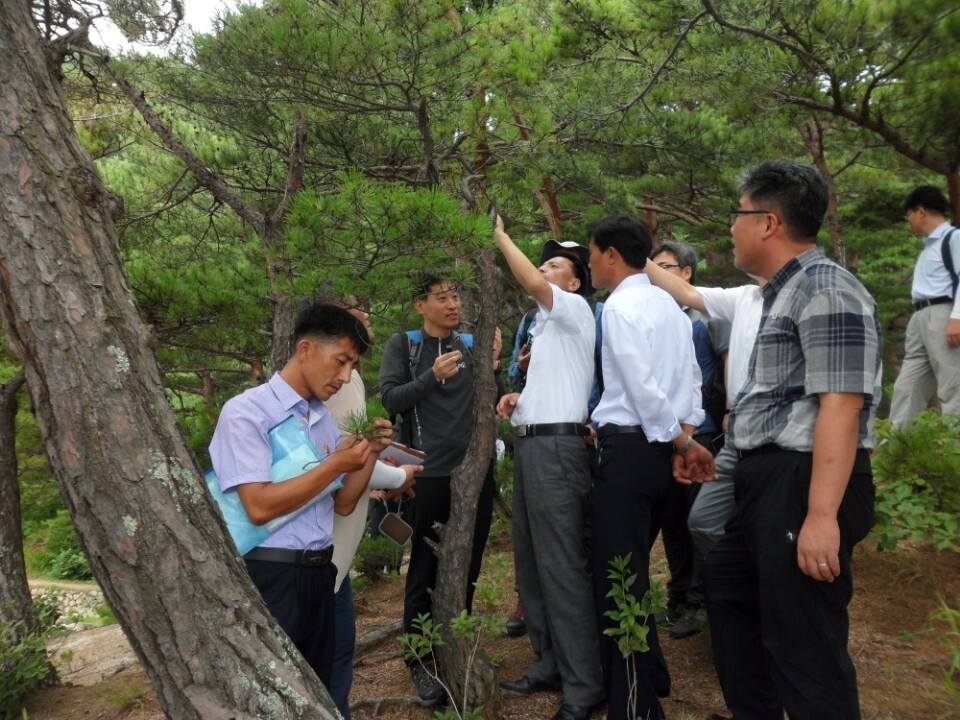hankyoreh
Links to other country sites 다른 나라 사이트 링크
South Korea massively increases 2019 budget for inter-Korean exchange

The South Korean government has allocated 880.3 billion won (US$794.1 million) in next year’s budget for supporting public livelihood cooperation and creating a basis for economic cooperation with North Korea to achieve the terms agreed upon in the Apr. 27 Panmunjom Declaration. The sum represents a 76 percent increase from this year’s budget of 499 billion won (US$450.2 million).
The budget for supporting divided family reunion will be nearly tripled, from 12 billion won (US$10.8 million) this year to 33.6 billion won (US$30.3 million), while support for social and cultural exchange will go up 59 percent, from 12.9 billion won (US$11.6 million) this year to 20.5 billion (US$18.5 million) next year.
“Funding for the Inter-Korean Cooperation Fund grew by 138 billion won [US$124.6 million] this year, moving from 962.4 billion won [US$868.8 million] to over 1 trillion won [US$902.7 million],” an official from the Unification Ministry said on Aug. 28. This was the first time in three years this figure has topped 1 trillion won.
The Unification Ministry’s 2019 budget announced by the government on Tuesday was 1.32 billion won (US$1.2 million), with 218.4 billion won (US$197.2 million) allocated for general accounts and 1.1 trillion won (US$992.6 million) for the Inter-Korean Cooperation Fund – in short, 83 percent of the total budget is reserved for the fund. Money earmarked for the fund was up 14.3 percent compared to the 2018 budget. But even more notable than the “ordinary” increase in the announced budget are changes in the budgetary details.
The budget for economic cooperation (which increased from 268 billion to 429 billion won [US$241.8-387.1 million]) consists of grants (309.3 billion won [US$279.1 million]) and loans (119.7 billion won [US$108 million]), a substantial amount of which will be used in the early stages of linking and modernizing inter-Korean roads and railways. This was one of the inter-Korean economic cooperation projects specified in the Panmunjom Declaration.
As the expression “laying the foundation for inter-Korean economic cooperation” suggests, these funds are being allocated not so much to launch projects as to “prime the pump” (in the words of a Unification Ministry official) by supporting design, supervision and the purchase of materials and equipment. This is regarded as a compromise measure that makes clear the country’s resolve to implement the Panmunjom Declaration while also bearing in mind UN and US sanctions on North Korea.
Funding for supporting livelihood cooperation (which increased from 231 billion to 451.3 billion won [US$208.4-407.2 million]) is comparable to humanitarian aid in the past. This consists of funding for fertilizer (200,000 tons, 132.3 billion won [US$119.4 million]), forestry cooperation and public health and medical care cooperation projects.
The government cut its budget for food aid to North Korea by two thirds, from 300,000 tons in previous years to 100,000 tons. Given the fact that the food aid funding was not spent for long periods of time, the government decided to only set aside an emergency supply of 100,000 tons to be used for natural disasters in North Korea.
The government has slashed its funding to support a planned North Korean human rights foundation from 10.8 billion won (US$9.8 million) this year to 800 million won (US$722,028), an adjustment that reflects the fact that the foundation’s office was closed in June.
“We took into account the fact that the foundation’s launch has been delayed by the National Assembly’s failure to reach an agreement on who will sit on the board of directors. For now, we’ve only requested the minimum funding necessary to prepare for the foundation’s establishment,” said a senior official at the Unification Ministry.
By Lee Je-hun, senior staff writer
Please direct comments or questions to [english@hani.co.kr]

Editorial・opinion
![[Column] Park Geun-hye déjà vu in Yoon Suk-yeol [Column] Park Geun-hye déjà vu in Yoon Suk-yeol](https://flexible.img.hani.co.kr/flexible/normal/500/300/imgdb/original/2024/0424/651713945113788.jpg) [Column] Park Geun-hye déjà vu in Yoon Suk-yeol
[Column] Park Geun-hye déjà vu in Yoon Suk-yeol![[Editorial] New weight of N. Korea’s nuclear threats makes dialogue all the more urgent [Editorial] New weight of N. Korea’s nuclear threats makes dialogue all the more urgent](https://flexible.img.hani.co.kr/flexible/normal/500/300/imgdb/original/2024/0424/7317139454662664.jpg) [Editorial] New weight of N. Korea’s nuclear threats makes dialogue all the more urgent
[Editorial] New weight of N. Korea’s nuclear threats makes dialogue all the more urgent- [Guest essay] The real reason Korea’s new right wants to dub Rhee a founding father
- [Column] ‘Choson’: Is it time we start referring to N. Korea in its own terms?
- [Editorial] Japan’s rewriting of history with Korea has gone too far
- [Column] The president’s questionable capacity for dialogue
- [Column] Are chaebol firms just pizza pies for families to divvy up as they please?
- [Column] Has Korea, too, crossed the Rubicon on China?
- [Correspondent’s column] In Japan’s alliance with US, echoes of its past alliances with UK
- [Editorial] Does Yoon think the Korean public is wrong?
Most viewed articles
- 1‘We must say no’: Seoul defense chief on Korean, USFK involvement in hypothetical Taiwan crisis
- 2Will NewJeans end up collateral damage in internal feud at K-pop juggernaut Hybe?
- 3[Column] Park Geun-hye déjà vu in Yoon Suk-yeol
- 4Why Korea shouldn’t welcome Japan’s newly beefed up defense cooperation with US
- 5Thursday to mark start of resignations by senior doctors amid standoff with government
- 6N. Korean hackers breached 10 defense contractors in South for months, police say
- 7[Guest essay] The real reason Korea’s new right wants to dub Rhee a founding father
- 8[Column] ‘Choson’: Is it time we start referring to N. Korea in its own terms?
- 9Kim Jong-un expressed ‘satisfaction’ with nuclear counterstrike drill directed at South
- 10[Editorial] New weight of N. Korea’s nuclear threats makes dialogue all the more urgent